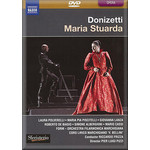
Donizetti: Maria Stuarda (complete opera recorded in 2007)
 $55.00
Out of Stock
$55.00
Out of Stock6+ weeks add to cart
GAETANO DONIZETTI
Donizetti: Maria Stuarda (complete opera recorded in 2007)
Sferisterio Opera Festival / Laura Polverelli / Maria Pia Piscitelli / Giovanna Lanza / Riccardo Frizza (cond)
[ Naxos DVD / DVD ]
Release Date: Wednesday 1 July 2009
This item is currently out of stock. It may take 6 or more weeks to obtain from when you place your order as this is a specialist product.
 Suitable for General Audiences
Suitable for General Audiences
"Mezzo-soprano Laura Polverelli... reveals impressive depths of dramatic vocal resource and a wide variety of tonal expression and colour, ideal in a good bel-cantist"
(MusicWeb)
"Mezzo-soprano Laura Polverelli is a little tentative vocally at the start as Elisabeth responds to the marriage proposal from France (CH.4). Once into her stride, as when she meets Leicester and expresses her distrust of him before finally kissing him passionately, she reveals impressive depths of dramatic vocal resource and a wide variety of tonal expression and colour, ideal in a good bel-cantist (CHs.11-13). The dramatic scene between the two Queens cannot be as frisson-loaded as this one certainly is unless the mezzo singing Elisabeth can match her soprano colleague for singing and acting; Laura Polverelli certainly does that. Elsewhere she sings with smooth legato and an excellent range of vocal colour and expression and, as with her soprano colleague, diction is first rate. She is smoother vocally than Anna Caterina Antonacci at La Scala whilst her acting is at a similar level of facial and bodily involvement.
As Leicester, Roberto De Basio is distinctly better than his La Scala colleague with a bright, forward and pleasingly Italianate squilla to his tone. Add sensitive phrasing and a good range of expression and tonal colour and his interpretation is wholly convincing. Notable are his singing in his duet with Talbot (CHs.8-10), confrontation with Elisabeth (CHs.11-13) and his ardent pleas to Maria (CHs.17-19) where their concluding phrases are unified in both phrasing and expression. As at La Scala Simone Alberghini sings well as Talbot and with more acted commitment than at La Scala. Mario Cassi's strongly sung Cecil is rather bland in his acting. Riccardo Frizza conducts with verve and vitality as well as with a strong dramatic sense. The Chorus Lirico Marchigiano is outstanding as is the recorded sound. The video director is a little fussy with constant movement between close-up, mid and distant shots.
I awarded the La Scala production the imprimatur of Recording of the Month. I am going to do the same with this performance. My only niggle with it is in the edition used. The La Scala production uses the Critical Edition by Anders Kiklund that has some music additional to this one, which uses that published by BMG Ricordi. The differences arise from the cancellation of the premiere by the King of Naples. Given his situation and the music completed, Donizetti had little say in the demand to set the music to another text. The safer subject chosen was related to the strife between the Guelphs and Ghibellines in pre-Renaissance Florence. Donizetti composed some new music and titled the work Buondelmonte. Not unexpectedly it was not a resounding success. Donizetti withdrew it after its Naples performances, determined to have Maria Stuarda performed somewhere in the form he had originally planned. In the interim he composed Gemma di Vergy for Milan, Marino Faliero for Paris and Lucia di Lamermoor for Naples. Whilst Maria Stuarda does not have quite the continuous melodic flow of Lucia di Lamermoor, it has its own melodic strengths and plenty of drama to compensate.
With further new music Maria Stuarda finally reached the stage at La Scala in December 1835 where after a mere six performances it was withdrawn on the instructions of the Milanese censors. It did not reach Naples in its original form until 1865 when both composer and Bourbon rulers were gone and after which it disappeared until revived in 1958 in Bergamo, Donizetti's hometown. Various versions of the score feature in audio recordings by the likes of Joan Sutherland (Decca 425 410-2), Edita Gruberova (Philips 475 224-2), and unofficial issues involving Leyla Gencer and Beverley Sills. Opera houses in Italy and elsewhere took up the work, particularly after a significant production by Giorgio de Home Lullo for the Maggio Musicale in Florence in 1967 featuring Leyla Gencer and Shirley Verrett. The set design and costumes for that production were by Pier Luigi Pizzi, director, set designer and costume designer at this and the La Scala production in 2008. His long experience of the work and the bel canto genre are evident in both."
(MusicWeb Recording of the Month May 2009)